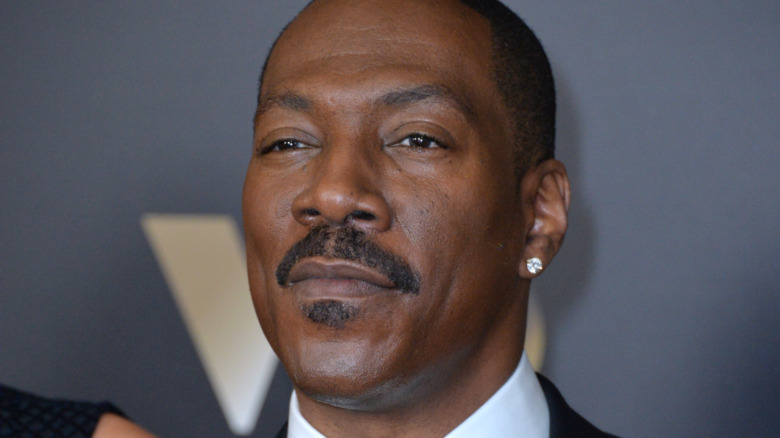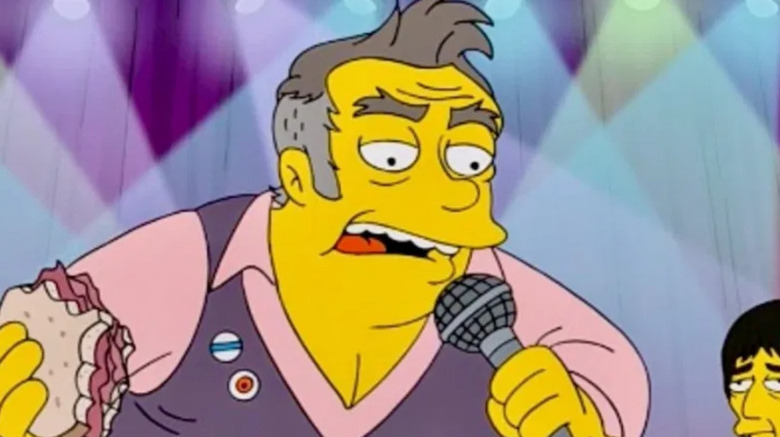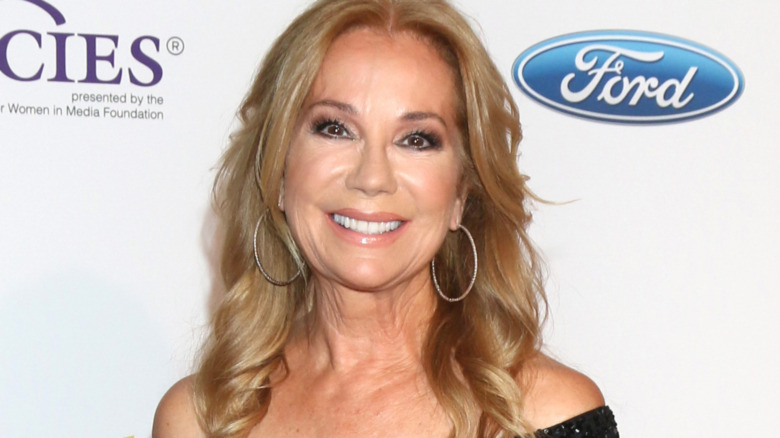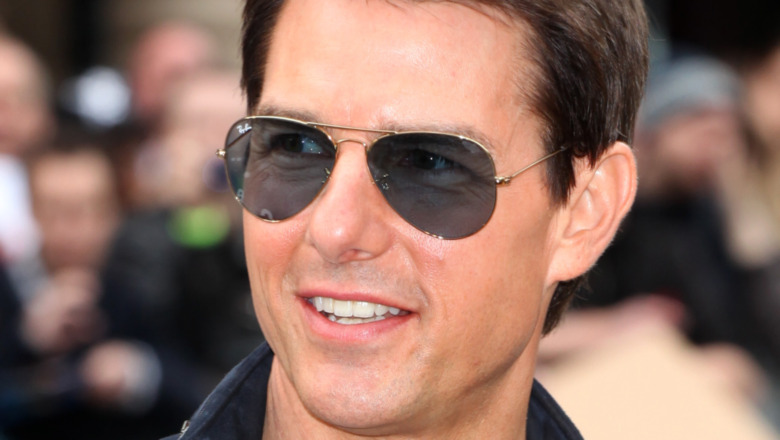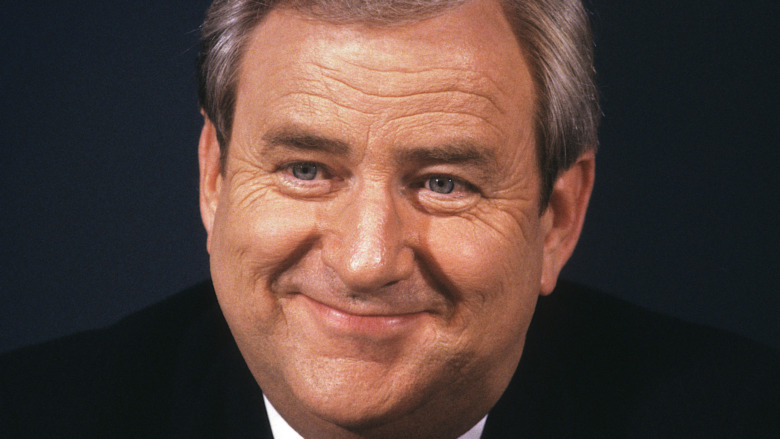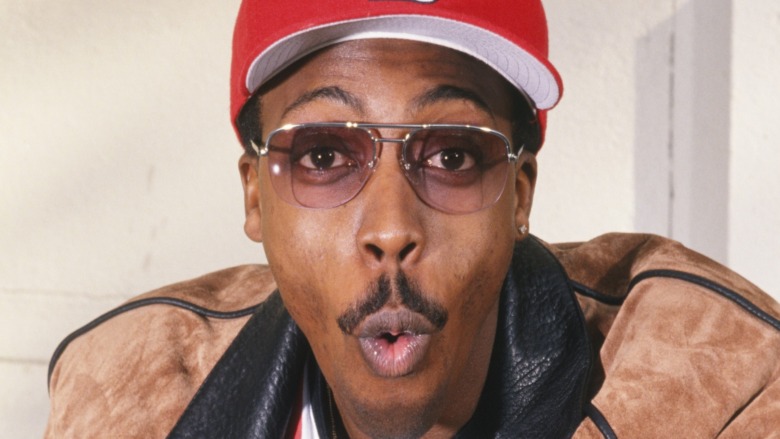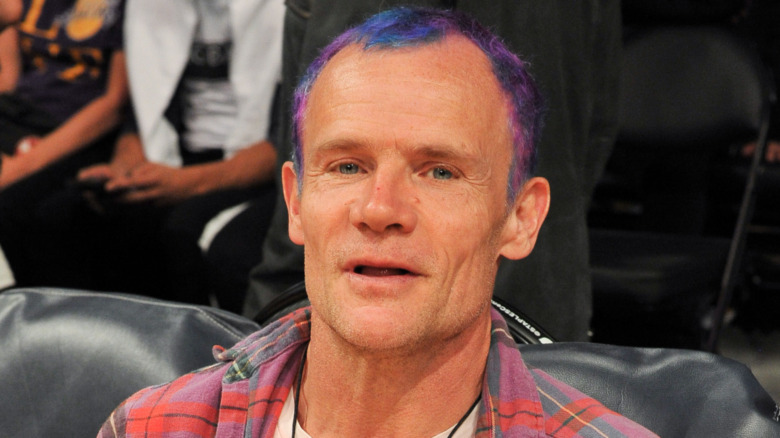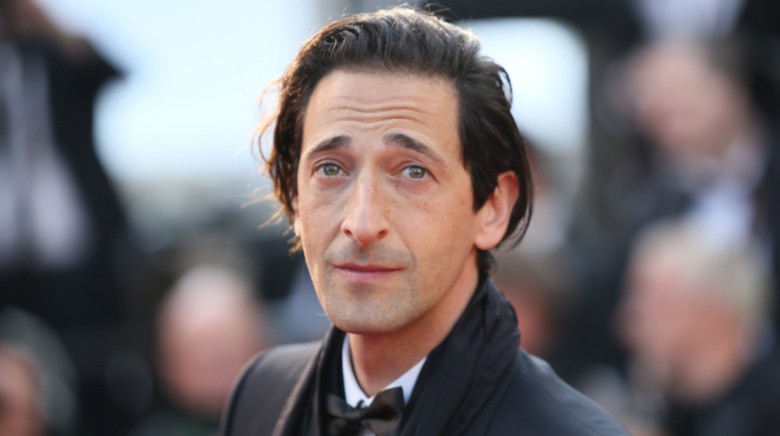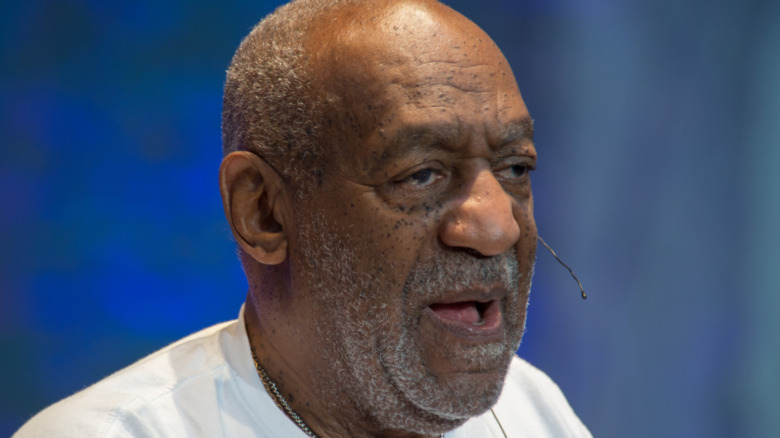Stars Who Got Parodied And Hated It
To be a celebrity and then have one's work, persona, or actions resoundingly mocked or critiqued by a satirical television series, parody musician, or sketch comedy show can bring with it some mixed feelings. Sure, it's a sign for the famous person that they have "made it" — that they're well-known, popular, and influential enough that their behavior is even worthy of criticism is a big step. For example, Jennifer Lawrence loved Ariana Grande's hilarious impression of her on "Saturday Night Live," even telling Vogue in 2017 that it was "spot-f**king-on."
But on the other hand, celebrities are also people with thoughts and feelings, and they might be so sensitive that a broad, comical send-up could send them reeling into a place of hurt, anger, or self-doubt, causing them to publicly lash out at those who tried to mine comedic content out of their lives. Unfortunately, those same celebs usually wind up looking like self-important, arrogant, thin-skinned jerks who just can't take a joke.
Here, then, are some actors, musicians, talk show hosts, and politicians who got razzed when they were parodied and made their displeasure known.
Eddie Murphy avoided SNL for years because of a joke at his expense
David Spade specializes in playing characters that are smirky and sarcastic, and who comment on the perceived nonsense around them with withering putdowns and verbal eye-rolls. It's a technique that has worked well for Spade, be it as a talk show host, a character in "Tommy Boy," and earlier in his career on "Saturday Night Live." On the late-night sketch comedy show, he played a dismissive flight attendant ("Buh-bye!"), a mean Gap employee, and, in the recurring feature "Spade in America," himself, as a mile-a-minute provider of snark at the expense of celebrities.
In a late 1995 installment of this particular sketch, a picture of Eddie Murphy appeared on the screen. The once bankable and beloved star had just starred in two back-to-back bombs, "Beverly Hills Cop III" and "Vampire in Brooklyn." Reflecting that, Spade quipped, "Look children, it's a falling star, make a wish!" The studio audience gasped at the remark, perhaps because Murphy was perceived as off-limits, as he was one of the greatest performers to ever star on "SNL."
In 2011, Murphy himself told Rolling Stone that Spade's joke was the reason why he never participated in any "SNL" retrospectives and hadn't returned to host. "They said some s**tty things," Murphy explained. "What really irritated me about it at the time was that it was a career shot." Eight years after that, however, Murphy finally hosted "SNL," in December 2019.
Morrissey took offense at The Simpsons' 'Quilloughby'
In an April 2021 episode, "The Simpsons" trained its satirical laser on Morrissey, lead singer of the influential '80s band The Smiths, a.k.a. "The Pope of Mope," a crooner of songs about misery and general dissatisfaction. In the world of "The Simpsons," misunderstood Lisa obsesses over Quilloughby, the Morrissey-like ex-frontman of The Snuffs, to the point that she makes the pointedly nasty hater of everything — except veganism — her imaginary friend. Her worship disastrously ends when she sees the real Quilloughby at a concert, and he's turned into a meat-eating racist.
The installment served as both homage and takedown of Morrissey, who in more recent years has made headlines not for music, but for legal battles with his ex-bandmates and publicly decrying immigration. And Morrissey, whom "The Simpsons" suggested hates most things, did not like how he was portrayed. "Other shows like 'SNL' still do a great job at finding ways to inspire great satire," a post on Morrissey's Facebook page read. "But when a show stoops so low to use harshly hateful tactics like showing the Morrissey character with his belly hanging out of his shirt (when he has never looked like that at any point in his career) makes you wonder who the real hurtful, racist group is here."
Morrissey later released another statement calling out "The Simpsons" and saying that he'd sue, but such an endeavor "requires more funding than I could possibly muster."
SNL's presidential prodding provoked the president
Since 1975, "Saturday Night Live" has poked fun at the American president. As a self-styled satirical program, it's the show's job (and stretching of free speech muscles) to speak truth to power and criticize the Commander-in-Chief. Every president from Nixon on has been savagely spoofed by "SNL," and every president seemingly accepted it as part of the job. Every president up until Donald Trump, that is.
Tiring of Alec Baldwin's over-the-top impression of him on the late-night sketch show, in February 2019 Trump tweeted (via CNN Business), "Nothing funny about tired 'Saturday Night Live' on Fake News NBC! Question is, how do the Networks get away with these total Republican hit jobs without retribution? Likewise for many other shows? Very unfair and should be looked into."
Baldwin thought Trump's tweet could incite violence, writing on Twitter (via CNN Business), "I wonder if a sitting President exhorting his followers that my role in a TV comedy qualifies me as an enemy of the people constitutes a threat to my safety and that of my family?"
Andy Samberg's Mark Wahlberg impression displeased Mark Wahlberg
During his seven-year stint on "Saturday Night Live," Andy Samberg didn't appear in a lot of live sketches. As one of the writers and stars of the troupe The Lonely Island, he made a name for himself with dozens of "SNL Digital Shorts," like "D**k in a Box" and "I'm on a Boat." On one of the rare times that Samberg did appear in a non-pre-taped fashion came at the very end of an October 2008 episode, in a sketch titled "Mark Wahlberg Talks to Animals." It was exactly that: Samberg portrayed the former "Marky Mark"-turned-action movie star, dressed in regular guy jeans and a plaid shirt, wandering around a farm and peppering real critters (a dog, a donkey, a chicken, a goat, and so on) with questions and observations. All in a loose approximation of Wahlberg's familiar breathy, high-pitched Boston accent and aggressive tone, Samberg ended most of the encounters with a jovial, "Say hi to your mother for me."
Wahlberg saw the sketch and he wasn't mad, just disappointed. "I didn't think it was as funny as I'd hoped," he told MTV News. "I love when people do imitations of me," he added, trying to suggest he can be a good sport, but then theorizing that the sketch could have been revenge. Wahlberg said that "SNL" producer Lorne Michaels had asked him to guest host several times, but that he'd always said no.
Kathie Lee Gifford didn't find Kristen Wiig's imitation funny
NBC's fourth hour of "Today" was unlike any other morning show. The 2000s-era broadcast featured hosts Hoda Kotb and Kathie Lee Gifford very casually chatting and reporting on celebrity gossip and human interest stories, generally over a few glasses of wine. In November 2009, "Saturday Night Live" parodied its fellow NBC series with a sketch starring Jenny Slate as Kotb and Kristen Wiig as Gifford. Wiig's half-drunk, self-conscious, unconfident Gifford goes off the rails, singing a schmaltzy song so poorly that it angers the Black Eyed Peas (cameoing as themselves) to the point where they violently assault the host.
Days after the sketch aired, Kotb and Gifford watched it on air, according to Us Weekly. "Everyone seems to enjoy it," an unimpressed Gifford said, "but I don't think it's that funny." When she expressed the idea that Wiig couldn't even sing very well, the offstage crew audibly disagreed. "Oh, it's okay to beat the crud out of me, that's fine. But when I say 'I'm sorry, the woman can't sing,' that's a problem for you people?"
Gifford ended the segment by imploring Wiig to quit "SNL," saying, "Can't she get another job? Go off and do something else?"
Tiger King's Carole Baskin found her SNL treatment less than regal
It's both the privilege and responsibility of "Saturday Night Live" to mock, tease, and comment on whatever is happening in the culture at any given moment. And in the spring of 2020, the mass phenomenon well-known and prominent enough to get skewered by "SNL" was "Tiger King," the multi-part Netflix documentary series about colorful and volatile roadside animal park operators. As millions of Americans were stuck at home during early coronavirus pandemic lockdowns, "Tiger King" viewers obsessed over the real-life people in the docuseries, perhaps none more so than Carole Baskin, a big cat-loving entrepreneur whom the series heavily implies was responsible for the disappearance and death of her first husband.
"SNL" cast member Chloe Fineman, a comedian with a knack for uncanny impressions, presented her take on Baskin in a sketch shot on video during the show's pandemic-caused "At Home" episodes. Fineman's Baskin was a "Master Class" teacher prone to using variants of words like "cat," "kitten," and "meow" with almost pathological regularity, before professing her innocence of murder.
The real-life Baskin, however, didn't think it was particularly flattering. "I could just slap that woman," she said on "The Pet Show Podcast" (via E!), explaining that when she films videos for the Cameo service now, customers often want her to sound like Fineman's impression, with all the affectations and cat words.
Tom Cruise took his resentment of South Park out in the open
Playing off the name of R. Kelly's serialized video and song, "Trapped in the Closet," a 2005 "South Park" episode of that name mocked Scientology and its most famous follower: movie star Tom Cruise. The episode incredulously outlines many of the church's beliefs, and a despondent Cruise locks himself in a closet and refuses to come out of the closet, implying that Cruise was a closeted gay man.
For his part, Cruise was livid over how both he and his religion were depicted on "South Park." According to NBC's "Today," Cruise reportedly refused to promote his upcoming movie, "Mission Impossible 3," a production of Viacom subsidiary Paramount Pictures, unless Comedy Central pulled a scheduled encore airing of "Trapped in the Closet" in March 2006. The network acquiesced, with show creators Trey Parker and Matt Stone releasing the following — and very real — statement through their lawyers (via NPR): "Scientology, you may have won THIS battle, but the million-year war for Earth has just begun! Temporarily anozinizing our episode will NOT stop us from keeping Thetans forever trapped in your pitiful man-bodies. Curses and drat! You have obstructed us for now, but your feeble bid to save humanity will fail! Hail Xenu!!! — Trey Parker and Matt Stone, servants of the dark lord Xenu."
However, Comedy Central would eventually broadcast this episode again and include it on DVDs, according to Free Speech Debate.
Jerry Falwell sued an adult magazine for mocking him
In the early 1980s, according to Rolling Stone, televangelist Jerry Falwell led the Moral Majority, a staunchly conservative and religious-minded political group that pushed "family values," an umbrella term for an opposition to most progressive causes. In response, Larry Flynt, a progressive, free speech crusader, and publisher of the pornographic "Hustler" magazine, ran a fake ad in a 1983 issue. Playing off of a series of winking Campari campaigns, where celebrities discussed their "first time" enjoying the spirit, the "Hustler" piece included a photo of Falwell discussing his "first time." The copy then described, in explicit detail, Falwell fornicating with his mother and a barnyard animal in an outhouse.
Falwell was so upset by the audacious bit of comedy that he sued Flynt and "Hustler," according to Cornell Law School, citing libel and intentional infliction of emotional distress. After a long legal battle, a judge ruled in favor of Flynt, because the "first time" piece constituted parody.
Arsenio Hall thought In Living Color dogged him
In 1989, Arsenio Hall injected some youth and energy into late-night television, dominated for nearly three decades at that point by Johnny Carson's unchanging "The Tonight Show." Hall, a comedian and actor best known for his supporting role in "Coming to America," was an effervescent and enthusiastic host of "The Arsenio Hall Show," pumping his fist to rile up a rowdy audience (which he called "The Dog Pound") while also wearing brightly colored suits and providing an outlet for young and African-American celebrities and hip-hop acts, none of which were often seen on "The Tonight Show."
All the things that made "The Arsenio Hall Show" so different also provided a lot of targets for humor and mockery. On the second-ever episode of Fox's primetime sketch comedy series, "In Living Color," in April 1990, show creator and star Keenen Ivory Wayans played Hall in a parody of "The Arsenio Hall Show," presenting the titular host as a guy with a massive rear-end who never stopped zooming and dancing around the stage or reminding viewers that he was close personal friends with Eddie Murphy.
According to Entertainment Weekly, Hall told reporters that he thought the sketch "wasn't funny" and a "vendetta" against him.
David Paterson didn't love his SNL send-up
"Saturday Night Live" cast member Fred Armisen recurred on "Weekend Update" as then-New York Governor David Paterson. Not only was Paterson news-worthy enough to be spoofed on "SNL," but he also bore a strong resemblance to Armisen. The actor presented Paterson as a wacky comedian, frequently making tired jokes about New Jersey. Then, Armisen, as Paterson, would wander around the set, bumping into things — because Paterson is blind.
In December 2008, Paterson's office issued a statement (via The New York Times) criticizing Armisen's impression. "The governor engages in humor all the time and he can certainly take a joke," communications director Risa B. Heller said. "However, this particular 'Saturday Night Live' skit unfortunately chose to ridicule people with physical disabilities and imply that disabled people are incapable of having jobs with serious responsibilities."
Armisen would tone down his portrayal of Paterson, and in a 2010 episode, "SNL" brought on the governor himself during "Weekend Update." During his segment, Paterson said (via Disability Scoop), "Jokes that degrade people just for their disabilities are sophomoric and stupid." And then, "SNL" issued a rare apology on air. "Governor, we are really sorry," host Amy Poehler offered, while cast member Seth Meyers added, "I think I speak for everyone here that we'll be more respectful of the blind."
Ivanka Trump would not be 'complicit' in her own satirization
In a 2017 episode of "Saturday Night Live," host Scarlett Johansson starred in "Complicit," a commercial parody that played up then-presidential daughter and advisor Ivanka Trump's public persona as a glamorous celebrity who tried to keep father Donald Trump's controversial actions at an arm's length. (The perfume was called "Complicit," and so, the sketch suggested, was Ivanka Trump.) After the sketch initially aired, Ivanka tried to own the situation.
"CBS This Morning" anchor Gayle King asked Ivanka about the "parodies" that called her out for being "complicit" with her father's political policies. "If being complicit is wanting to be a force for good and to make a positive impact, then I'm complicit," she said, deftly spinning the language of the sketch to her favor.
But privately, Ivanka was apparently livid over the "SNL" fake ad. In her book, "Unhinged" (via ET), Omarosa Manigault Newman, a former "Apprentice" contestant-turned-Donald Trump administration advisor, revealed Ivanka Trump's displeasure after the sketch first aired. "At the senior staff meeting, Ivanka couldn't stop bemoaning it, how offensive it was, how ridiculous it was," she wrote. "We'd all been subject to 'SNL' attacks. We'd all been hit, many of us in that same week's show. But Ivanka would not stop talking about being ribbed." Newman added, "Like her father, Ivanka was thin-skinned and could not seem to take a joke."
Coolio hated a 'Weird Al' Yankovic parody, but later relented
"Weird Al" Yankovic has improbably kept a career as a purveyor of novelty parody songs going for 40 years, offering spoofs of whatever is popular, from New Wave to Michael Jackson to Nirvana. Yankovic also found a way to satirize hip-hop with "Amish Paradise," a parody of Coolio's huge 1995 hit "Gangsta's Paradise," replacing the details of a man surrounded by death and crime with the day-to-day of a barn-raising, electricity-shunning farmer.
Backstage at the 1996 Grammy Awards, according to Vulture, a reporter asked Coolio what he thought of "Amish Paradise." "I think that my song was too serious," Coolio said, adding that he didn't "appreciate him desecrating the song like that." According to Yahoo! Entertainment, Yankovic doesn't need the original artist's permission for a parody — it falls under fair use laws — but he still likes to get the go-ahead so there's no bad blood. "Two separate people from my label told me that they had personally talked to Coolio," Yankovic said, "and that he told them that he was okay with the whole parody idea." Later, he found out that Coolio and his management didn't care for it, but his label told him to go ahead with the song anyway.
Coolio later came around. "I sat down, and I really thought it out," he said at a 2001 lecture. "I was like, 'Coolio, who the f**k do you think you are? He did Michael Jackson. Michael Jackson didn't get mad.'"
A Red Hot Chili Pepper didn't think a parody rocked
In 1993, "Weird Al" Yankovic responded to the unlikely popularity of Red Hot Chili Peppers that combined funk, punk, and provocative lyrics to become a Los Angeles cult favorite before the success of the addiction ballad, "Under the Bridge," and the blistering "Give It Away" made them pop radio and MTV stars. Yankovic combined the melodies of those two 1992 hits and wrote some lyrics told from the view of cartoon character Fred Flintstone to create "Bedrock Anthem." (The refrain "give it away, give it away, give it away now" logically turned into "Yabba-dabba-yabba-dabba-dabba-doo now," for example.)
The Red Hot Chili Peppers always presented themselves as fun-loving party animals who just wanted to help people have a good time, so it was something of a surprise when the band's bassist, a man who goes by Flea and often wore little more than a pair of underwear briefs on stage, took umbrage with "Bedroom Anthem."
"I didn't think it was very good," Flea told VH1's "Behind the Music." "...It wasn't that great. Yabba dabba do?" Flea added that while he generally likes Yankovic's stuff, "everyone's hit and miss."
Adrien Brody didn't care for Family Guy's nosy antics
"Family Guy" makes fun of people at such a high rate that the animated Fox series was probably bound to offend one of its targets at some point. Each of its more than 300 episodes contain numerous, quick "cutaway" bits, mostly direct, hard-hitting sight gags that have no bearing on the plot. The 2012 "Family Guy" episode "Friends Without Benefits" includes a cutaway of teenager Meg Griffin attending a 3-D movie in which Academy Award-winning actor Adrien Brody does sit-ups, and his large and comically exaggerated nose takes up the entire theater screen, terrifying filmgoers.
The joke here is simple, if cheap: Brody has a big nose. And yet this is one that came back to haunt "Family Guy" creator and star Seth MacFarlane. When asked on "Watch What Happens Live" to name a celebrity that hadn't taken their animated ribbing in stride, MacFarlane offered up Brody. "I walked up to him at a party 'cause I'd just seen 'Splice' and I thought it was awesome," MacFarlane told host Andy Cohen. "I said, 'Hey I really liked "Splice," I hope there's no hard feelings.' And essentially the upshot was, 'Well, there are.'"
Bill Cosby threatened the producers of an underground cartoon
Justin Roiland and Dan Harmon co-created Adult Swim's smash hit sci-fi dark comedy, "Rick and Morty," which was born out of a "Back to the Future" parody called "The real Animated Adventures of Doc and Mharti," which screened at Harmon's continuing Los Angeles film showcase and competition, Channel 101. Roiland additionally won several Channel 101 contests with another low-budget animated series, "House of Cosbys." It's about a guy named Mitchell who creates a cloning device to make multiple copies of Bill Cosby, and they all live in a reality show-style house together. It soon becomes clear that each successive clone is inferior to the last, although every tenth Cosby copy has superhuman abilities.
The real-world Cosby apparently wasn't amused. According to The New York Times, his attorneys sent cease and desist orders to Roiland and Harmon in 2005, demanding that they end production on their underground, independent cartoon show. The Cosby clone show quickly died.


